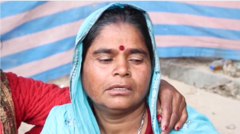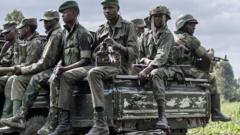Maxim Shugalei, a prominent figure in Russia's campaign to expand its influence across Africa, faces scrutiny after being arrested in Chad, raising questions about his future operations and affiliations.
Why Maxim Shugalei's Africa Influence Campaign Came to a Halt

Why Maxim Shugalei's Africa Influence Campaign Came to a Halt
Russian operative's controversial activities in Africa take a downturn after detention in Chad.
In the realm of global influence, few figures are as polarizing as Maxim Shugalei, a Russian operative presented in glorified terms in propaganda films portraying him as a daring hero on a mission to elevate Russia’s standing in Africa. Realistically, Shugalei has been a significant character in the expansion of Russian influence across the continent, working closely with the infamous Wagner Group. However, his recent arrest in Chad has stirred up debates about his future endeavors.
Alongside fellow operatives Samer Sueifan and E Tsaryov, Shugalei was detained in September under ambiguous circumstances, but was released and sent back to Russia earlier this month, as confirmed by the Russian embassy. Shugalei, who labels himself a sociologist, is illustrated by analysts as a cunning spin doctor and agent of influence with a penchant for spreading disinformation campaigns favorable to the Wagner Group.
Since 2023, he has found himself under EU sanctions for his activities promoting Russian interests in several African nations and is also on the sanctions list from Ukraine. His ties with the late Yevgeny Prigozhin, Wagner's founder, have previously been downplayed but appear increasingly evident. Shugalei garnered attention for involvement in a spying case in Libya, where he nursed ambitions of influencing local elections, hand-in-hand with Prigozhin's directives.
Known for dramatic escapades worthy of cinematic adaptation, Shugalei's exploits have inspired a trilogy of action films sponsored by Prigozhin, glorifying Russian operations in Libya. Despite such creative representations, it can be challenging to ascertain the real-world impact of his influence, particularly following Prigozhin’s sudden death last year.
The landscape of Russian influence is in flux; while Shugalei's role in the Wagner Group seemed secure, the recent restructuring of these operations under Kremlin oversight raises serious questions about the extent of his authority. Current insights suggest that Shugalei retains some influence in the political circuitry of Africa, particularly as he continues endorsing Wagner's original agenda through his communications platforms.
Shugalei's recent arrest in Chad lacks clarity, with speculations ranging from Western intervention to domestic concerns of destabilization through disinformation. Analysts believe that as Chad cultivates ties with Russia, the government remains cautious, potentially feeling threatened by Shugalei's connections and the historical backdrop of attempted destabilizations marked by failed assassination plots tied to Wagner.
Despite challenges, Shugalei's media presence thrives, as social networks transmit pro-Russian narratives across Africa. He continues to share his journeys through Africa, albeit with a theatrical flair that some view as comedic rather than compelling. As the global gaming board shifts, Shugalei’s future in Africa remains uncertain, suspending the viewer's interest in what unfolds within this regional matrix of power struggles, foreign influences, and propaganda wars.





















